Biden Holds Large Lead Over Trump Among LGBTQ Voters as Pride Month Winds Down
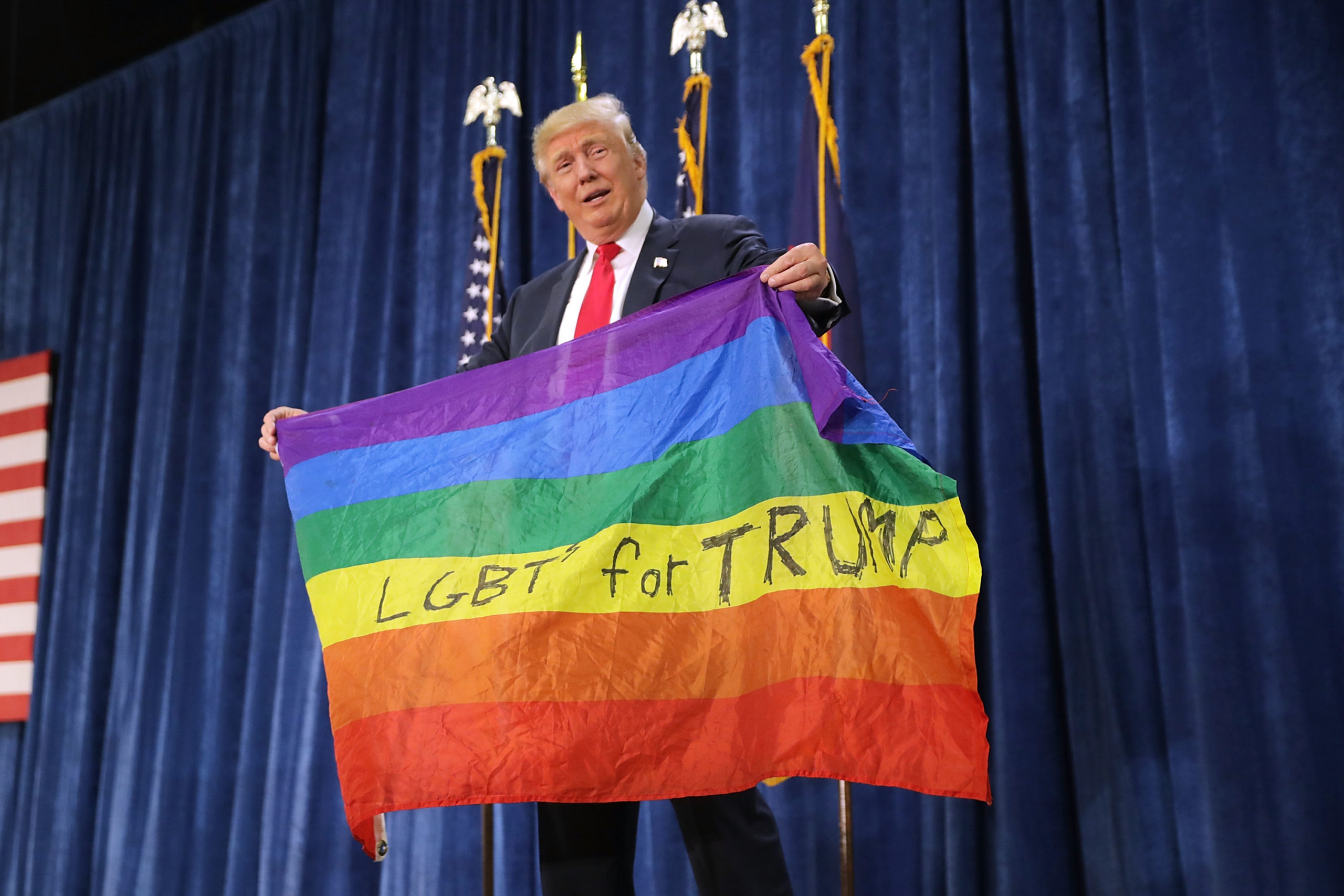
Key Takeaways
Joe Biden outperforms his vote share with straight Republicans by an average of 13 points among LGBTQ Republicans.
53% of LGBTQ voters have favorable opinions of Biden, more than twice the share (20%) who have favorable views of Donald Trump.
Surveys find LGBTQ Republicans are whiter, wealthier, more likely to be men and less ideologically homogeneous than their Democratic peers.
While former Vice President Joe Biden trailed Sen. Bernie Sanders (I-Vt.) for support among LGBTQ voters during the Democratic presidential primary, the now-presumptive nominee far surpasses President Donald Trump's standing with lesbian, gay, bisexual, transgender and queer voters as he gears up for a general election matchup.
According to Morning Consult tracking of the 2020 contest, Biden has led Trump among LGBTQ voters nationwide by an average of 43 percentage points, 63 percent to 20 percent, since polling conducted the week after his March 3 Super Tuesday victories, with figures largely unchanged over 15 surveys. In the latest poll, conducted June 15-21 among more than 30,000 registered voters, Biden led Trump with the demographic by 45 points, 64 percent to 19 percent. (Among all voters, the survey found Biden leads Trump, 47 percent to 39 percent, with a 1-point margin of error.)
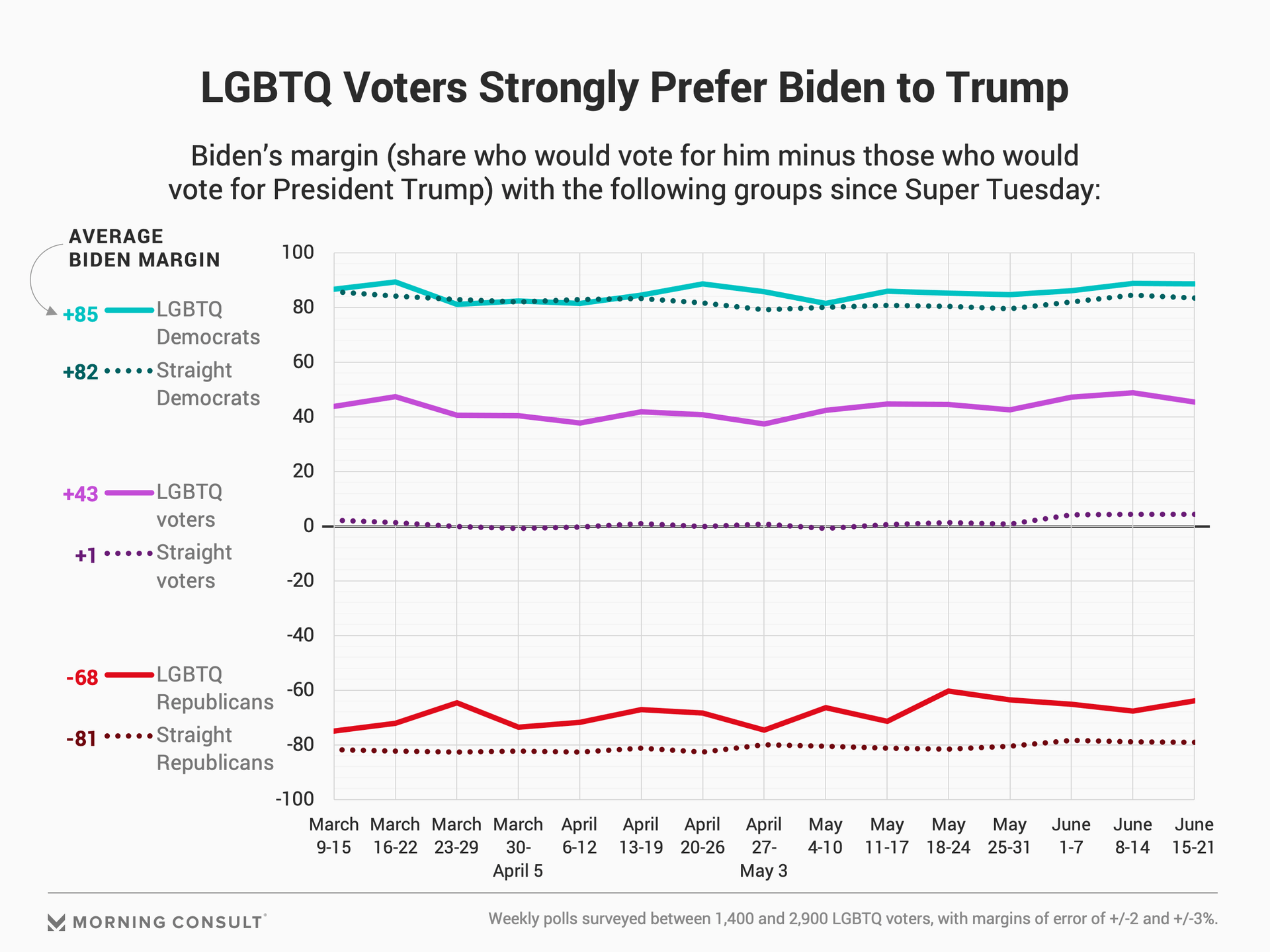
The gap is driven by an average 86-point lead among LGBTQ Democrats (89 percent to 3 percent), a 28-point lead among LGBTQ independents (47 percent to 19 percent) and an overperformance among LGBTQ Republicans compared to Biden’s standing with heterosexual Republicans.
On average, the GOP’s LGBTQ voters are 5 points more likely than straight Republicans to say they’ll vote for Biden (12 percent to 7 percent) and 8 points less likely to say they would vote for Trump (80 percent to 88 percent).
That divergence reflects the group’s younger and more urban bent compared to the broader Republican Party, where their sway is limited compared with their Democratic counterparts. LGBTQ people make up about 4 percent of GOP voters, compared to 12 percent of the Democratic Party’s coalition.
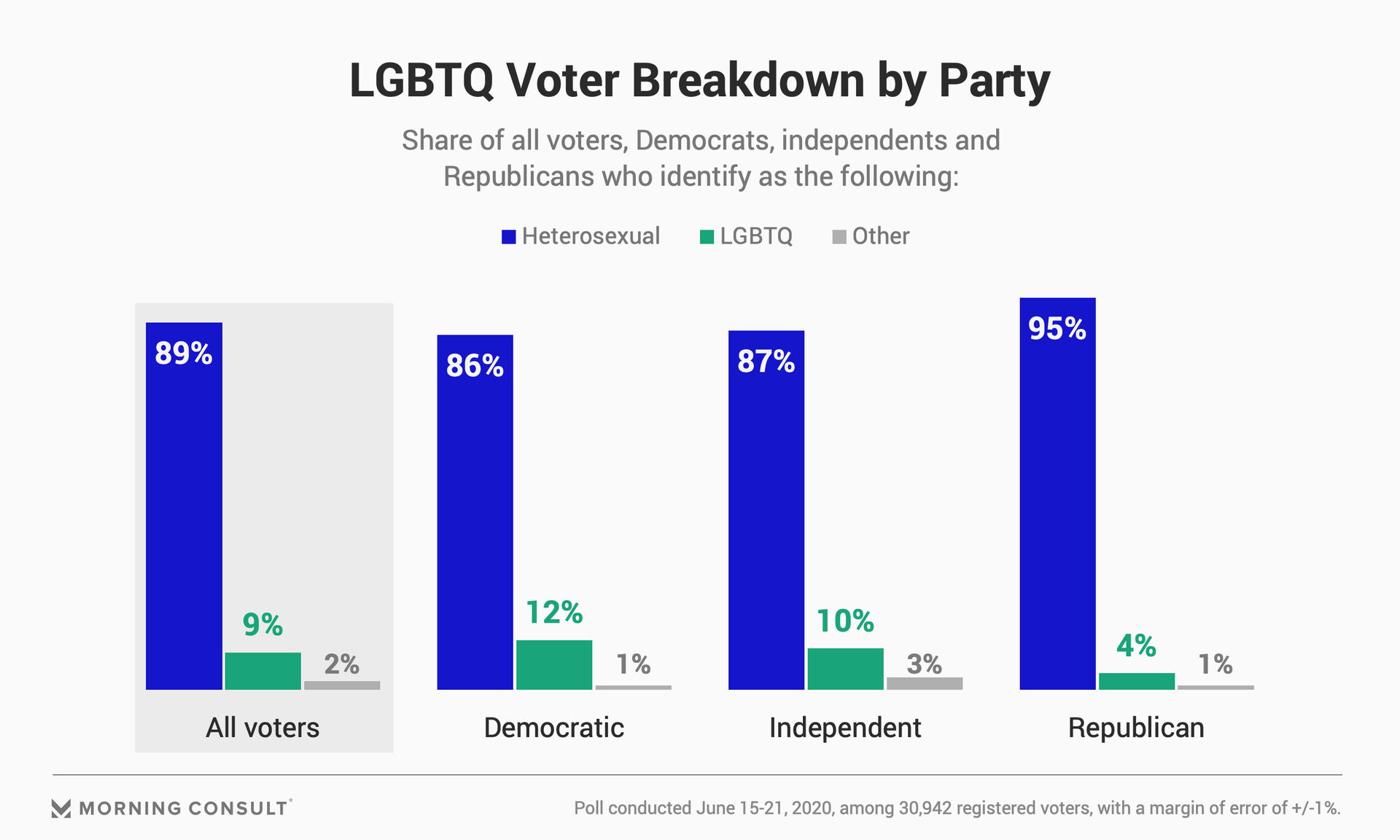
The numbers come at the end of the annual pride month, when millions of Americans salute LGBTQ rights. This year, the celebration was boosted by a surprise Supreme Court decision that banned workplace discrimination based on sexual orientation and gender identity. The popular decision’s 6-3 majority included the vote of Trump appointee and conservative Justice Neil Gorsuch.
Trump campaigned in 2016 as a “real friend” of the gay community, but ultimately lost the vast majority of their votes to Democratic nominee Hillary Clinton, according to exit polling. Since then, Trump and his administration have been at odds with LGBTQ activists on issues involving the military, housing and health care. By comparison, Biden is credited with pushing former President Barack Obama to publicly embrace gay marriage ahead of his 2012 re-election campaign.
Over half of LGBTQ voters (53 percent) have favorable opinions of Biden, more than twice the share (20 percent) who view Trump favorably. Among LGBTQ Republicans, 23 percent have positive views about the former vice president (11 points higher than heterosexual Republicans) and 65 percent have negative opinions (compared to 83 percent of their straight counterparts).
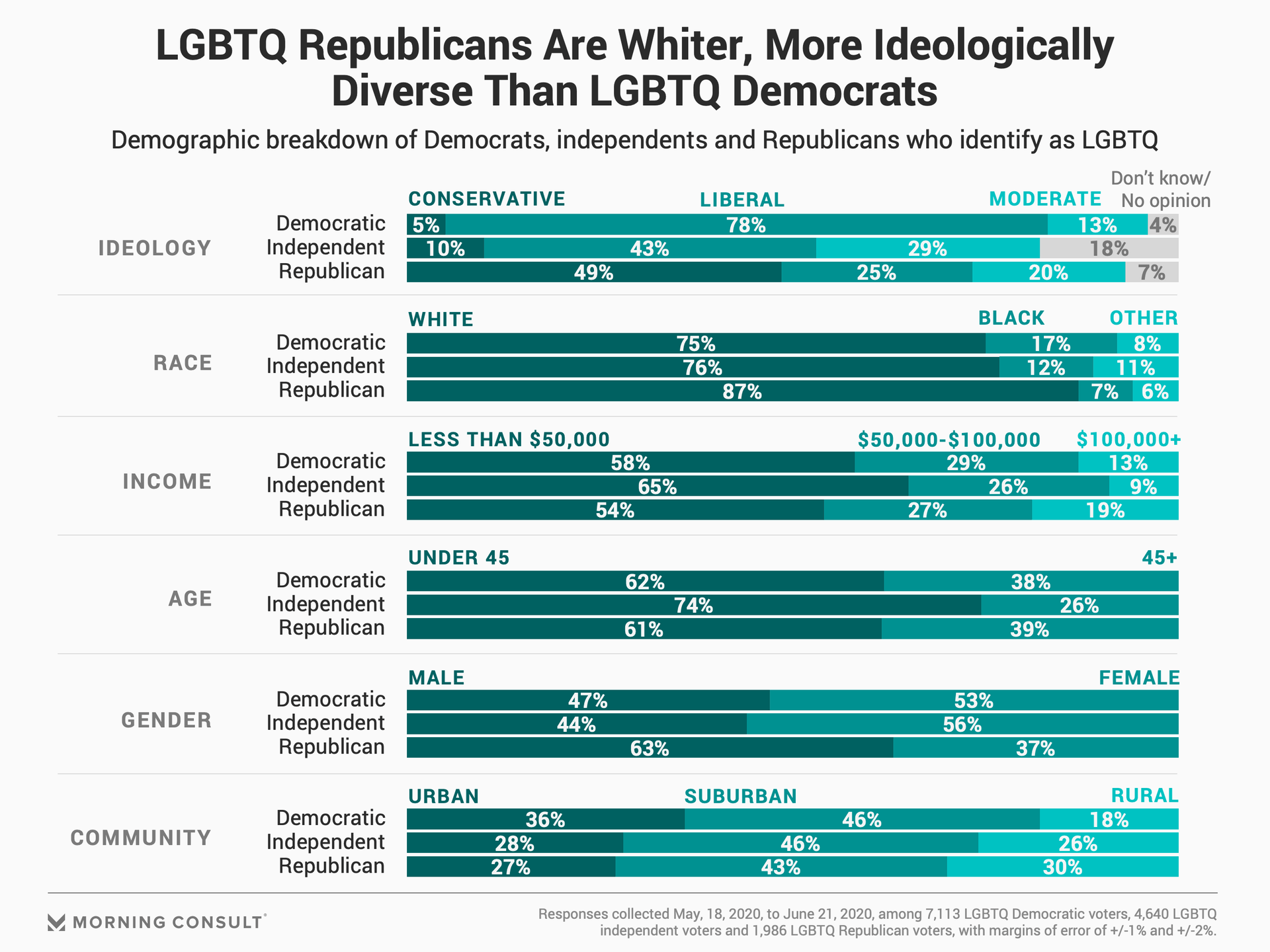
Compared to LGBTQ Democrats, LGBTQ Republicans are less ideologically homogenous: Twenty-five percent identify as liberal, five times the share of LGBTQ Democrats who identify as conservative and they are also 7 points more likely to say they’re moderate (20 percent to 13 percent).
Like the Republican Party as a whole, LGBTQ Republicans are whiter and make more money than their Democratic peers. And they are more likely to be men than either LGBTQ independents or LGBTQ Democrats.
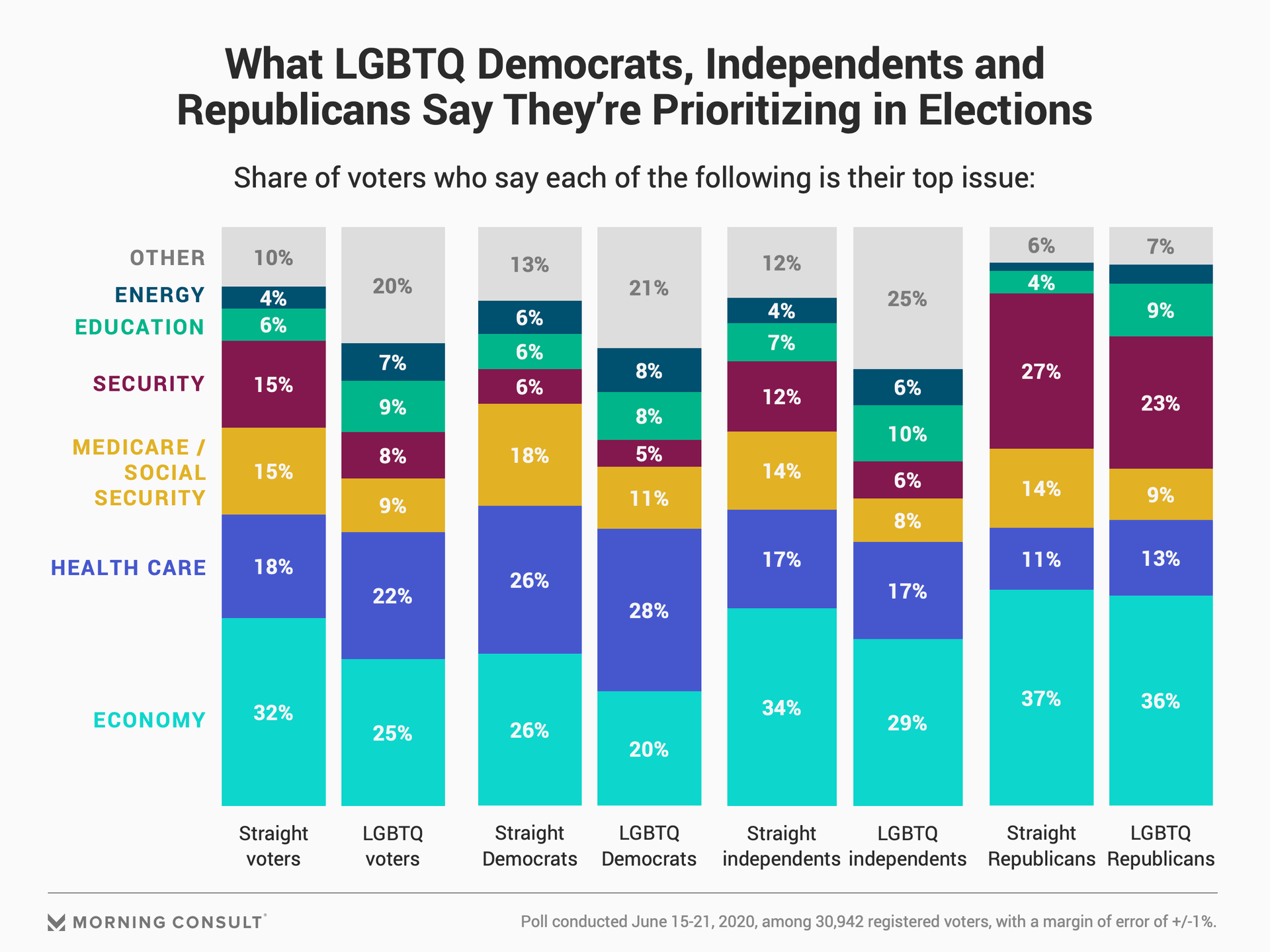
Overall, LGBTQ voters are less likely than straight voters to prioritize the economy (25 percent to 32 percent) security (8 percent to 15 percent) and Medicare and Social Security (9 percent to 15 percent). But the LGBTQ community is more likely to prioritize health care (22 percent to 18 percent) and issues that predominantly affect women, such as birth control, abortion and equal pay (11 percent to 4 percent).
Eli Yokley is Morning Consult’s U.S. politics analyst. Eli joined Morning Consult in 2016 from Roll Call, where he reported on House and Senate campaigns after five years of covering state-level politics in the Show Me State while studying at the University of Missouri in Columbia, including contributions to The New York Times, Politico and The Daily Beast. Follow him on Twitter @eyokley. Interested in connecting with Eli to discuss his analysis or for a media engagement or speaking opportunity? Email [email protected].